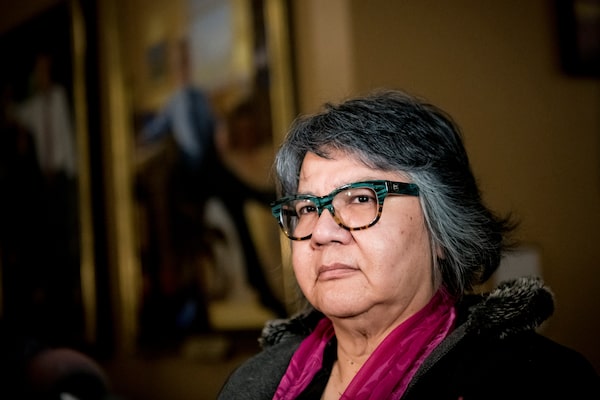
RoseAnne Archibald will be the first woman to serve as national chief of the Assembly of First Nations.Christopher Katsarov/The Canadian Press
RoseAnne Archibald, from the Taykwa Tagamou Nation in Northeastern Ontario, has been elected national chief of the Assembly of First Nations, the first woman to hold the position in the advocacy organization’s 50-year history.
Ms. Archibald, who served as the Ontario regional chief of the AFN until she announced in May she was stepping aside to run for national chief, was surrounded by her family and community members as she read the oath of office.
She said she was very grateful to be part of a historic moment.
“The glass ceiling has been broken,” Ms. Archibald said during her acceptance speech.
The AFN national chief plays a key role in influencing government policy of importance to First Nations. The role involves working with Canadian government officials, including the Prime Minister and federal cabinet ministers.
The job is especially critical now, as recent discoveries of unmarked burial sites near former residential schools continue to draw attention to Canada’s troubled efforts to reconcile with Indigenous peoples.
The national chief will work with other First Nations leaders across the country as communities decide whether they want to examine potential unmarked burial sites. She will also likely be in contact with the federal government on next steps.
Ms. Archibald’s platform included a call to focus on truth before reconciliation. If elected national chief, she said, she would support and advocate for resources for Indigenous people who are healing from intergenerational trauma, particularly those who endured abuse at residential schools.
Ms. Archibald also said she would work with federal partners to take action to implement the 94 calls to action from the Truth and Reconciliation Commission, which examined the long-standing impacts of the schools.
The AFN is an advocacy organization representing more than 900,000 First Nations people in 634 communities across the country.
Ms. Archibald, who has broken many glass ceilings in her career, has been involved in First Nations politics for 31 years. She is a third-generation chief.
In 1990, at 23 years old, she became the first woman and youngest chief ever elected by the Taykwa Tagamou Nation. She repeated the feat by becoming the first woman and youngest person ever to be elected deputy grand chief for Nishnawbe-Aski Nation (NAN), an organization representing 49 First Nations in Ontario. Then she became the first woman and youngest person to hold yet another elected role: Grand Chief of the Mushkegowuk Council, which represents seven First Nations along the James Bay coast. And she was the first woman to be elected as the Ontario regional chief for the AFN, a role she assumed in 2018.
Some of the other planks in Ms. Archibald’s platform included working with all regions to build a post-pandemic recovery strategy for First Nations, and increasing the AFN’s engagement with women, youth and gender-diverse people. She also pledged to press for the implementation and recognition of inherent and treaty rights, in accordance with the United Nations Declaration on the Rights of Indigenous Peoples.
Ms. Archibald’s success came after five rounds of voting on Wednesday and Thursday. The election was held online during the AFN annual general assembly.
Ms. Archibald had 205 votes on the last ballot and did not meet the threshold required to win, which was support from 60 per cent of registered voters. (There were a total of 406 registered voters.)
But she ended up not needing the additional votes. Her remaining competitor, Muskowekwan First Nation Chief Reginald Bellerose, of Saskatchewan, decided to concede prior to a sixth round of voting. He had received 144 votes on the fifth ballot.
The other candidates who ran in the race were Nishnawbe Aski Nation Grand Chief Alvin Fiddler; Jodi Calahoo-Stonehouse of Michel First Nation in Alberta; Kevin Hart, who has served as the AFN’s Manitoba regional chief; Lee Crowchild of Tsuut’ina First Nation in Alberta; and Cathy Martin of the Listuguj First Nation in Quebec.
In his concession speech, Mr. Bellerose said he ran a clean and great campaign, and that he hoped people would get to know the kind of leader he is.
After the result was announced, Jody Wilson-Raybould, an independent MP who also served as B.C. regional chief of the AFN, said Ms. Archibald’s win was “truly history in the making.”
“I could not be happier,” she wrote on Twitter. “Bravo my friend, bravo.”
Indigenous Services Minister Marc Miller congratulated Ms. Archibald on Thursday, saying he has enjoyed a productive working relationship with her throughout the pandemic.
Perry Bellegarde, Ms. Archibald’s predecessor as national chief, has yet to comment on her win.
In February, The Globe and Mail reported that Ms. Archibald was the subject of a harassment probe commissioned by the AFN. A briefing report prepared for the AFN’s executive committee noted that there were allegations and evidence that were credible, and that merited a full investigation. Ms. Archibald said at the time that she believed the probe was reprisal for a campaign she was leading for more financial accountability at the AFN.
Ms. Archibald said she immediately raised the harassment allegations with Mr. Bellegarde, who was then national chief, and told him they appeared related to a confidential Chiefs of Ontario (COO) resolution that sought an independent financial review of the AFN. Mr. Bellegarde said at the time that AFN staff had made many harassment complaints against Ms. Archibald, and that they were unrelated to the COO resolution.
Chiefs at the highest level of the AFN then decided to proceed with a full investigation into the allegations levelled at Ms. Archibald.
Know what is happening in the halls of power with the day’s top political headlines and commentary as selected by Globe editors (subscribers only). Sign up today.